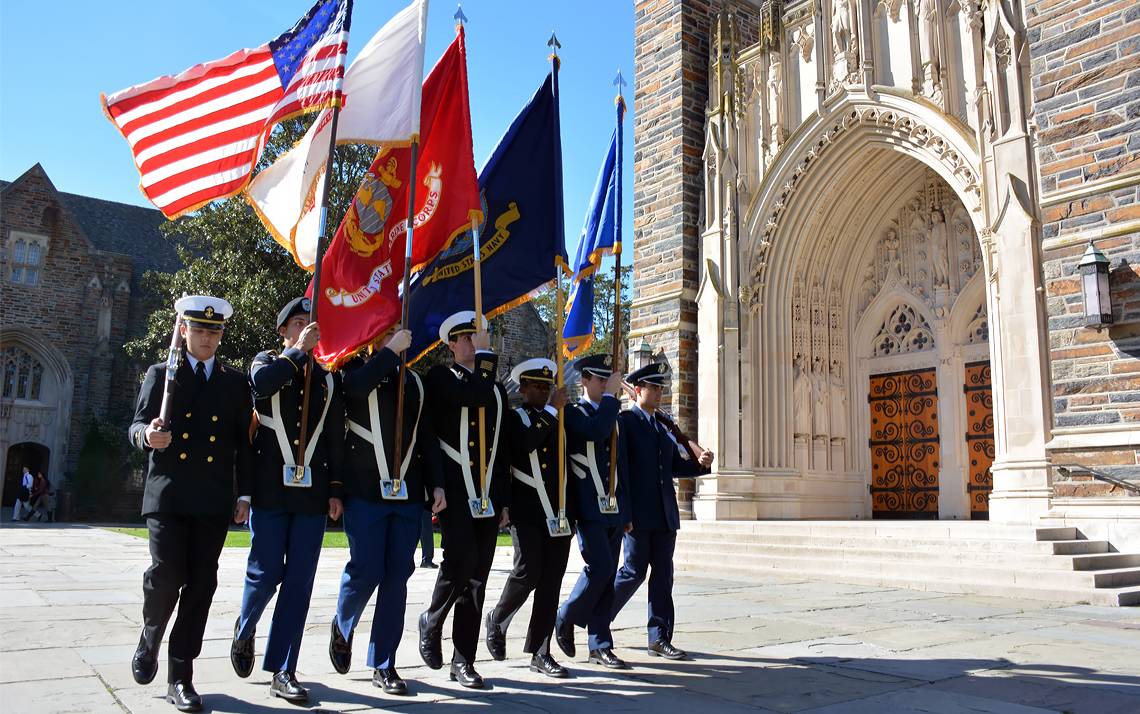Commemorating Veterans Day
Employee veterans reflect on how military service helps their work

About 800 Duke employees identify as veterans of the U.S. Armed Forces, including some who remain as reservists today. For all, skills gained while serving now benefit them in civilian life at Duke.
“The things that are branded into us are values of honor, courage and commitment,” said Sgt. Brian Royer, a recruiter with Human Resources who served in the Marines from 2002 to 2006. “We’re taught about service to our country and leadership, skills that align with Duke’s values to be a forward thinker or day-to-day leader.”
Join the Duke community at 11 a.m. Friday, Nov. 11, outside Duke Chapel for Duke's annual commemoration event. Immediately after the program concludes, the Duke Alumni Association will lead a wreath-laying ceremony at the Memorial Wall beside Duke Chapel, next to Duke Divinity School.
As the community commemorates Veterans Day, Working@Duke asked employee-veterans how their service shapes their work.

Yeoman First Class Deborah Daye
Navy, 1983 to 1987; Navy Reserve 1987 to 2013
Senior benefits analyst, Human Resources
“A premise of service is how quickly you can adapt. Starting in boot camp, officers see how fast they can shake you. In my four years of active duty, we were doing anti-submarine warfare during the Cold War. We were on high alert missions all the time. We had to stay on our toes.
This has helped me adjust to problems, especially with my temperament. I think I get through difficult situations quicker than others because of that military experience.”

Lt. Col. Michael Slack
Army Reserve, 1988 to present
Enterprise storage manager, Duke Clinical Research Institute
“During my time with Duke, I’ve also served in roles with the Army Reserve, from executive officer in a Basic Combat Training unit to director of Defensive Cyber Operations throughout Southwest Asia.
It has improved my critical thinking, problem solving and management skills, teaching me to observe and assess a complex situation and break it down into manageable components. In wartime and peacetime, my experience allows me to look at projects as a strategic thinker.”

Maj. Gen. Charles J. Dunlap Jr.
USAF (Ret.) Air Force, 1976 to 2010
Professor of the practice of law and executive director at the Center on Law, Ethics and National Security
“One of the reasons I like teaching at Duke Law so much is that the students remind me of many of the people with whom I worked in the military. Like the vast majority of people in uniform, Duke Law students exhibit the same kind of energy, work ethic, and intellectual curiosity that I saw in young military lawyers.
The military is all about mentorship, and that transfers readily to teaching at Duke. A big part of mentorship is telling people what they need to hear versus what they may want to hear. I think that most Duke Law students really want that kind of feedback.
The military gave me the chance to travel the world and live a lot of places in the U.S. as well as Korea and England, in addition to deployments to Africa and the Middle East. This experience not only helps in relating to Duke’s very diverse student population, but also helps inform my teaching and put in context many of the things we see in the news today.
As a military member, you learn to work with people in situations of extremely high stress and where the stakes are literally life and death. While only a few will enter the military, I think that background helps me to prepare students to face the difficulties and challenges they will face in life regardless of their career path.”